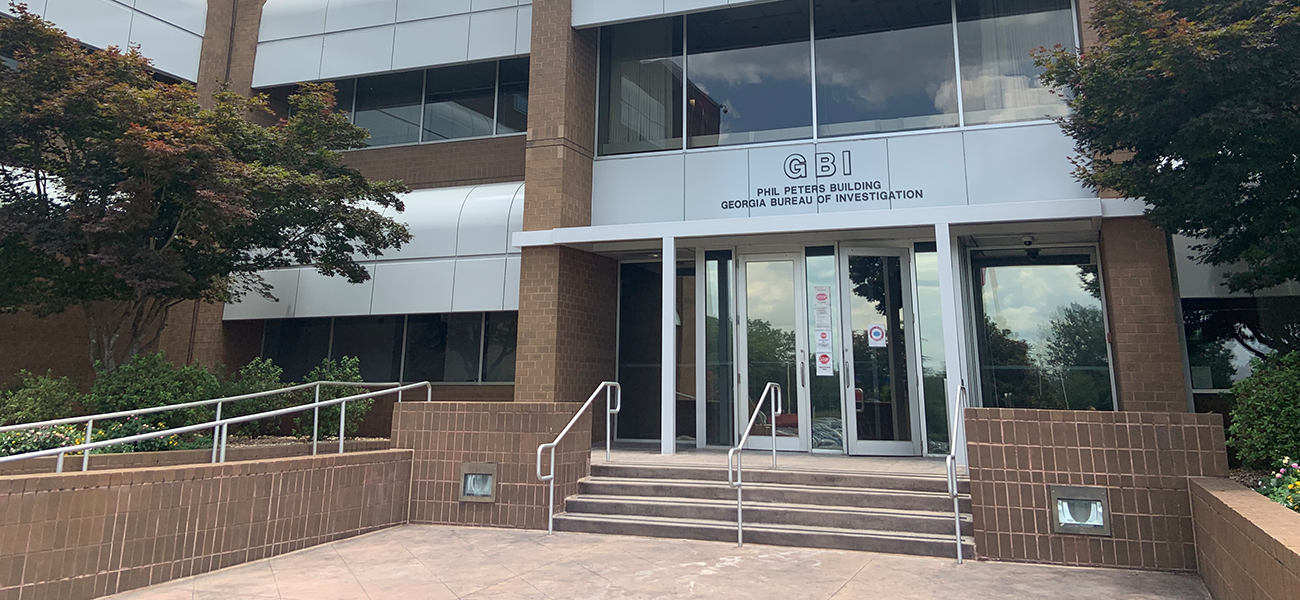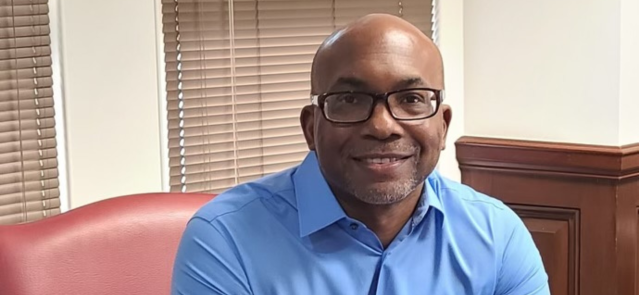Stay ahead of the curve as a political insider with deep policy analysis, daily briefings and policy-shaping tools.
Request a DemoOnly a fraction of Georgia police report use-of-force data to the FBI

Headquarters of the Georgia Bureau of Investigation in Decatur, Georgia. (Credit: Alessandro Marazzi Sassoon/State Affairs)
- There’s no authoritative database to track police use of force data at a state or national level.
- Participation in the only federal database by agencies is voluntary and the buy-in low.
- Police chiefs and reform advocates alike say they want better data collection.
- 57 out of 774 agencies in Georgia participated in providing use-of-force data to the FBI in 2021.
Georgians can compare the successes and failures of most government services when deciding where to live, but residents can’t easily know if their police department has a good track record when it comes to killing or seriously injuring people. Without authoritative data to inform better police practices, criminal justice reform is difficult to craft, let alone measure.
Crime and police violence have become major stories in the U.S., but Georgians are still in the dark regarding the behavior of their police. There’s no official database of police shootings and serious use-of-force incidents in Georgia, despite years of advocacy by activists and police officials.
It’s a point of frustration for LaGrange Police Chief Lou Dekmar.
“The best data, unfortunately, right now, is The Washington Post’s database,” said Dekmar, who has been LaGrange’s police chief since 1995. “So, shame on us.”
Just 1 in 10 law enforcement agencies in Georgia are enrolled in the country’s only official data collection of police shootings and use-of-force incidents, accounting for just 35% of the state’s sworn officers, according to the Federal Bureau of Investigation (FBI).
In 2020, the Georgia Bureau of Investigation (GBI) reported they were called in to investigate 96 police shootings and 30 other use-of-force incidents. But those totals are not complete. They only include those incidents GBI is requested to investigate. According to mappingpoliceviolence.org, some 309 Georgians have been killed by police based on data collected between 2013 and 2020, with Black people being 1.7 times more likely to be killed than white people.
“There’s a woeful lack of transparency and consistency in the nature and type of data that is shared on all aspects of policing, but particularly in the area of use of force,” said Nancy La Vigne, executive director of the task force on policing at the Washington D.C.-based nonprofit Council on Criminal Justice.
Why do we need a database?
La Vigne said the situation is such that it’s difficult to identify police agencies that embody best practices using data.
For years, police reform advocates and top police officials have requested that nationwide data be collected for the most serious police encounters. In response, the FBI finally established a national police use-of-force database in 2019 to collect data on the following use-of-force incidents along with basic demographic data about the officers and people involved:
- Those resulting in the death or serious injury of an individual; and
- Those resulting in the discharge of a firearm in the direction of a person, even absent death or injury.
For Georgians trying to know how their police departments are doing, this data can inform the often fierce debate around policing and crafting appropriate policy reform when needed.
“It’s imperative that the data be tracked for a couple of reasons,” said Dekmar.
For one, he said, having a sound statistical base allows leaders to review officer-involved incidents and determine if training or policy needs modification.
“There’s also officer safety considerations,” Dekmar said. “So there’s very good reasons for gathering the data and very good reasons for reviewing the data.”
The data can not only shed light on where problems might be but also potentially prove many law-enforcement advocates’ contention that instances of deadly force – whether justified or not – are relatively rare.
“A police-involved shooting is a very rare event,” Dekmar said. “We should be pushing this information out so that there is context on how rare these events are when placed up against all the different contacts and calls for service the police handle every year.”
“And we can’t do that now because we don’t have a database that everyone would contribute to.”
Existing sources of data on police shootings and use-of-force incidents have limitations, experts say. Even the most exhaustive databases, such as the websites Fatal Encounters and mappingpoliceviolence.org, are incomplete or lack third-party verification. The creation of the FBI database is endorsed by national and regional police groups, including the International Association of Chiefs of Police (IACP) and the Georgia Association of Chiefs of Police.
After the murder of George Floyd by police officers in Minneapolis last year, then-President Donald Trump signed an executive order in June to support participation in the database. But participation is voluntary, and buy-in from law enforcement agencies is slow. Critically, the FBI will only release parts of the data publicly when 60% and 80% participation thresholds are met nationally.
For now, the public can only know whether agencies are enrolled to provide data. The FBI has not yet released statistics about incidents themselves.
“I think that is just something that they’re treating just as optional,” said Natalie Ammons, the GBI’s deputy director of public and governmental affairs. “Not that they don’t think that it’s a good idea or that they oppose it. They just haven’t committed anyone to doing it.”
Ammons, also a member of the national task force for use-of-force data collection, is the state’s point person for getting police departments and sheriff’s offices to enroll in the program.
“We’re just working with them as much as possible to just try to show them the ease of use and how quick it is and that it’s a positive thing,” Ammons said.
Sometimes it’s just reminding agencies that reporting a “zero” is also important, even when there are no serious or deadly force incidents in a month, she said. “It verifies that you did not have any incidents that month as opposed to maybe you did, maybe you didn’t.”
Why no buy-in?
Ammons emphasizes outreach and education as the main hurdle and hopes the return to face-to-face interactions and events such as policing conferences will help her get the word out to chiefs and sheriffs that they should report their data.
Beyond that, she suspects some agencies may be hesitant to commit resources, particularly smaller ones that are strapped for cash. They might also be wary of how data will be used amid a heated political debate and calls to defund the police, she said.
Bibb County Sheriff’s Office spokesman Lt. Sean De Foe cited the voluntary nature of the program when asked why the agency wasn’t participating. He also said the agency was looking at how to alter its electronic forms to “accurately track, pull and submit the necessary data to the FBI.”
“We do not have an estimated start date at this time,” he said.
Dekmar said he doesn’t buy excuses not to participate.
“It’s not a heavy lift,” he said, adding that it takes just 30 to 45 minutes for an agency to sign up. Reporting no incidents takes minutes while reporting an incident when one does occur might take an hour, he said.
“I mean, if you’re having so many serious injuries or shootings that it requires you altering your database, that would rise to the level of concern for me,” he said.
Dekmar, also the past president of the IACP, noted police departments should already be collecting use-of-force information routinely. It’s just a matter of reporting it onwards, he said. Dekmar estimated that his agency, which has just under 100 officers, making it larger than most in the country, has had about 14 reportable incidents in the 26 years he’s served in LaGrange. By his estimate, reporting the incidents might require an hour per year on average for most departments.
“I don’t understand for most agencies why it would require major modifications to their software,” he said, explaining the simplicity of the process.
“It’s a drop-down,” he said. “If you’re doing the review of the use of force incident, you’re going to have this information and then it’s just a matter of populating the database that is a part of the FBI reporting software,”
This year, the participation of police agencies nationwide represents just half of the country’s nearly 700,000 police officers, with 6,543 out of 18,514 agencies participating. Georgia lags behind the rest of the U.S., with only 73 agencies enrolled to provide data and just 57 out of 774 doing so. Those agencies, which cover many of the metro areas of the Peach State, account for about 35% of officers.
Change in administration, priorities
Georgia used to lead the pack. Police here were among the first in the nation to participate when the program started with a pilot in 2017. Of 98 agencies that participated in the pilot, 20 were from Georgia.
Under former Gov. Nathan Deal, setting up the use-of-force database was a priority. His GBI director, Vernon Keenan, chaired the national task force that Ammons now sits on. Dekmar was also among those to jump in first and attributed the early interest by several agencies to Keenan’s role on Deal’s criminal justice reform task force, which also included creating alternative-sentencing courts and other projects.
But with a change of administration, priorities shifted. Under Gov. Brian Kemp, some $2 million was cut from Deal’s initiative. Kemp’s focus has been cracking down on gang violence, creating and funding a Gang Task Force to the tune of $2.5 million over two years. While there have been murmurs of reviving a criminal justice reform task force that would prioritize issues like reporting data or outright introducing legislation to require the reporting at a state level, nothing concrete has materialized.
Fix it with a law?
Christopher Bruce, the political director of the American Civil Liberties Union (ACLU) in Georgia, said that widespread support for data collection exists not just among law enforcement chiefs but also prosecutors, public defenders and Georgia’s top judges.
“However, there has always been a pushback, or a sense (that) this is a bigger hurdle that the state of Georgia cannot overcome, that has come from local law enforcement agencies,” he said, noting that hesitancy has been the case with past attempts to collect data, such as on hate crimes.
“Transparency is not what Georgia has been known for,” he said.
One solution is to pass state legislation to mandate that reporting to GBI, which could then simply report that data to the federal government.
“I’m not saying that every jurisdiction is doing something wrong,” Bruce said.
“But for every jurisdiction to prove that they have nothing to hide, is one of the things that really everyone should be mandated to do so we can look further into it: The way that the police are interacting with the public.”
That possibility isn’t out of the question. Requiring quarterly reporting by police agencies to the state was signed into law in Florida last month as a part of a police-reform package negotiated by the Republican majority in the legislature working with Black Democrats.
But if the legislature in Georgia doesn’t act, the federal government can use a carrot-and-stick approach, noted Dekmar, the LaGrange police chief. The federal government can withhold grants to an entire jurisdiction if a law enforcement agency doesn’t comply, creating a political consequence for the department, Dekmar said.
“I mean, that would solve this in a minute: No state or federal grants unless you contribute to the database,” he said. “No need to pass a bunch of laws. Nothing engages people more than funds.”
In the meantime, Ammons of the GBI is still focusing on education and outreach. She had a booth at the Georgia police chiefs association summer conference last month.
“We’ve just been kind of constantly just trying to push it out, push it out … sometimes people forget, you know they’re busy, and they just forget,” she said, adding that it’s “just as a friendly reminder for those that have been hearing about it.”
Bruce doesn’t mince words: “As clearly and concisely as possible: the state of Georgia needs to pass mandatory reporting for use-of-force.”
Should Georgia require police to report serious use-of-force incidents to a national database? Let us know your thoughts and questions about this topic by emailing [email protected].
Header image: Headquarters of the Georgia Bureau of Investigation in Decatur, Georgia. (Credit: Alessandro Marazzi Sassoon/State Affairs)
Newly minted Senate Minority Leader Harold Jones II: ‘I’m not the typical back-slapping politician’
Nearly 10 years into legislative life, Sen. Harold Jones II wouldn’t change anything about the experience. “I love every minute of it. Even when I hate it, I love it,” the 55-year-old Augusta Democrat told State Affairs. Come January, Jones will add another role to his legislative duties: Senate minority leader, a job held for …
Gov. Kemp calls on state agencies to be fiscally restrained amid record $16.5B surplus
The Gist Gov. Brian Kemp asked the state’s 51 government agencies for continued fiscal restraint when drafting their amended fiscal year 2025 and 2026 budgets. Most agencies adhered to his request even as the state’s general fund surplus hit a record $16.5 billion last month. Forty-five agencies, excluding state courts, followed the governor’s instructions to …
Georgia defies bomb threats as election chief declares a “free, fair and fast” vote amid record turnout
ATLANTA – Despite dealing with over 60 bomb threats, Georgia’s election chief said Tuesday the state’s general election went smoothly. Georgia had a record turnout with nearly 5.3 million people voting, Secretary of State Brad Raffensperger told reporters. Election officials in the state’s 159 counties have until 5 p.m. to certify votes. “We had a …
In the (state)house: Meet the newest members of the Georgia legislature
When lawmakers reconvene at the state Capitol on Jan. 13, there’ll be a cadre of new faces in the 236-member Georgia General Assembly, one of the nation’s largest state legislatures. All 236 statehouse seats were up for election this year. Most candidates ran unopposed. Incumbents in contested races easily kept their seats, with the exception …




